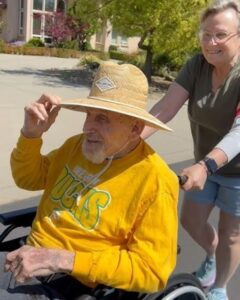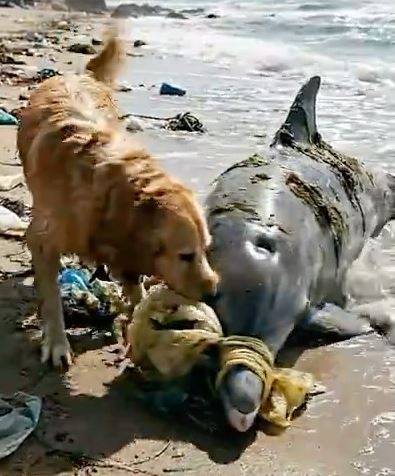It all started on a Thursday morning that felt like it was dragging. I was six weeks into a sabbatical from my job at the high school. Burnout, they called it. I called it “finally listening to my body.” I had no grand plans—just sleep, books, and long walks. But after a couple of weeks bouncing between Netflix and caffeine, I started feeling like I was becoming furniture in my own apartment.
So, I signed up to volunteer at St. Mark’s Community Church. I figured it might get me moving again—give me something real to hold onto. Maybe I’d serve coffee after mass, help with rummage sales, smile at elderly ladies, and pretend I knew how to fold brochures. Nothing major.
Instead, they handed me a name and an address scribbled on a notecard: “E. Alden, 742 Willow Bend.” There was a note underneath: *Could use company. Fair warning: a bit… particular.*
“Particular” didn’t even begin to cover it.
I knocked three times on his faded blue door before it creaked open. Mr. Alden’s face appeared, like a suspicious cat in a window. He had salt-and-pepper stubble, thick glasses, and a brow that looked permanently knitted in judgment. “They sent you?” he asked, his voice gravelly and unimpressed. “You look like you’re here to sell me vitamins.”
I smiled, keeping my tone light. “Just here to help, Mr. Alden.”
He looked me up and down, like he was figuring out the threat level of my cardigan, then grunted and turned his wheelchair around, leaving the door open behind him.
His house smelled faintly of dust, wood polish, and yesterday’s toast. Everything was neat, but there was something about it that felt like time had slowed down inside. Books stacked with precision. Coasters perfectly aligned. But the windows were smudged, and the plants were more stick than leaf. Clean, but lonely.
I talked. He didn’t. Or barely did. By the end of an hour, he offered me weak tea and a strong opinion on how kids today don’t know how to use their hands.
That’s when I asked him if he ever went outside.
He raised one eyebrow. “Not since the ice melted and my dignity slipped with it.”
That’s when I learned about the stroke. Minor, but enough to weaken his left side. The ramp outside was too steep and narrow. He’d tried it once after the snow thawed and ended up sliding halfway down before he managed to catch himself. No injuries, but it was enough to convince him to stay inside. No family nearby, no neighbors he was close to, and he certainly wasn’t going to ask for help.
So, I didn’t wait for him to ask.
The next day, I showed up with a drill, a level, and my brother-in-law’s toolbox. Mr. Alden blinked at me through the screen door.
“You know this is technically trespassing,” he said.
“I’m not changing the world,” I told him. “Just your driveway.”
It took three days of measuring, unscrewing, stabilizing, and adjusting. He watched the whole process like I was building a rocket ship. But when I finally secured the last bracket and stepped back, he nodded—not just at the ramp, but at me. That Saturday, I wheeled him out onto the sidewalk.
He tipped his straw hat to every single neighbor like he’d never stopped doing it.
We sat at the edge of Ashbury Park, and he told me about the motorcycles he used to fix, his late wife’s unbeatable rhubarb pie, and how therapy always seemed a little too “fake” for him—but maybe I talked too much to be ignored.
I came back every other day after that. I brought groceries. We argued over how scrambled eggs should be cooked. I showed him how to use the voice feature on his phone. He still called it “that smug rectangle.”
But I wasn’t the only one paying attention.
On a sunny Monday morning, Mr. Alden wheeled himself out to the front yard—and stopped cold.
Every volunteer from church was there. Paint buckets, cleaning supplies, toolboxes, and gift bags in hand. Teenagers, moms, grandpas, and toddlers. The quiet cul-de-sac looked like a block party had exploded.
“What is all this?” he asked, squinting.
“An ambush,” I said, grinning.
Within the hour, the fence was scraped and getting a fresh coat of forest green. Inside, a group of women armed with gloves and lemon-scented spray wiped down every forgotten surface. One of the high schoolers who usually hid behind her hoodie donated her old Wii console. “It still works,” she said shyly. “I could show you how to bowl.”
He blinked like she’d just offered him the moon. “You know I used to bowl a 180 average?” he replied, suddenly transformed into the man who wore leather jackets and flirted with his wife over jukebox tunes.
We spent the week transforming his house into a place that felt alive again. Someone hung new curtains. Someone else planted petunias in the front. A man from the neighborhood installed grab bars in the bathroom and modified the kitchen drawers so they opened with just a gentle nudge.
The Wii was a hit. Mr. Alden cursed like a sailor the first time his Mii guttered two frames in a row. But he laughed, too. A real laugh. The kind that shakes your shoulders and clears cobwebs from corners of your soul you didn’t even know had dust.
By the end of the week, his home wasn’t just cleaner—it was lighter. Like it had exhaled after holding its breath for too long.
And so had he.
He started spending mornings on his porch again. Neighbors waved. Kids stopped by to challenge him at digital tennis. He even came to the community center’s trivia night, though he swore he hated team games.
On the last evening of my sabbatical, I stopped by with a loaf of banana bread and a question I’d been thinking about for days.
“Do you think you’d have come out eventually?” I asked him, as he poured us both a glass of iced tea.
Mr. Alden looked out at his freshly painted fence, then at the score sheet from last night’s Wii bowling session, proudly displayed on his fridge with a chicken-shaped magnet.
“No,” he said simply. “I think I would’ve watched the seasons change from behind glass until I forgot what spring smelled like. You didn’t just bring a wrench. You brought a door back that I thought was permanently closed.”
I didn’t know what to say. So I just nodded, and we sat in the golden hush of evening.
Sometimes, fixing something small—like a crooked ramp or a forgotten mailbox—unlocks something bigger. Sometimes, people just need a little nudge, a good conversation, and a reason to believe that tomorrow might be better.
And sometimes, the best way to find your own purpose… is to help someone else rediscover theirs.
Has helping someone ever led you to rediscover something about yourself? Share your story in the comments.
Like and share this if you believe that small acts of kindness can create lasting change




